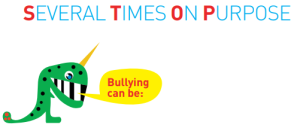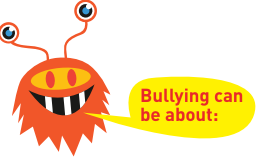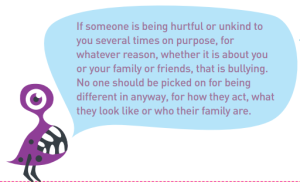Anti-Bullying
As a school, we believe it is important to uphold fundamental British Values, to ensure everyone is treated equally and with respect.
What is bullying?

Bullying is when a person is hurtful or unkind to someone else, on purpose and more than once. Bullying can be done by one person or by a group of people and can be towards one person or a group of people.
Bullying can be:
- Hitting or saying you are going to hit someone
- Touching someone when they don’t want you to
- Calling someone names, teasing, using rude language or saying nasty things about someone to them or to other people.

- Race or ethnicity (racist bullying)
- Religion or belief
- Family and culture
- Sexist bullying, which is bullying someone because of their gender. For example, because they are a boy or a girl, or saying they are acting ‘like a boy’ or ‘like a girl’
- Homophobic or biphobic bullying. This is saying unkind or nasty things because someone is lesbian, gay or bisexual, or because you think they are, or because they have two mums or two dads. It is also calling someone lesbian, gay or bisexual on purpose to be unkind or nasty to them, for example ‘you’re so gay!’
- Transphobic bullying. This is saying unkind things because someone is trans, or because you think they are trans, or being nasty about trans people (someone who feels the gender they are given as a baby doesn’t match the gender that they feel themselves to be).
- Special educational needs or disability
- What someone looks like
- Where someone lives
Bullying can be about:
•Stealing or damaging someone else’s belongings
•Ignoring someone on purpose or leaving them out
• Sending hurtful or unkind texts, emails or online messages to someone or about someone
Why does bullying happen?
Although bullying doesn’t happen very much at this school it might happen. Bullies can be older or younger than you, bigger or smaller than you. Bullies pick on people who may be different in some way and try to make them feel worse about themselves. If you are being bullied remember that it is never your fault.
Bullying can be about:
•Stealing or damaging someone else’s belongings
•Ignoring someone on purpose or leaving them out
• Sending hurtful or unkind texts, emails or online messages to someone or about someone
Why does bullying happen?
Although bullying doesn’t happen very much at this school it might happen. Bullies can be older or younger than you, bigger or smaller than you. Bullies pick on people who may be different in some way and try to make them feel worse about themselves. If you are being bullied remember that it is never your fault.

What should I do if I think someone is being bullied?
Talk to the person and ask if they’re ok and try to find out if they are being bullied. If they are, ask if you can help them talk to a teacher or an adult they trust.
What should I do if I’m being bullied?
If you are being bullied it is important to tell someone you trust. Tell an adult or friends, either at school or at home. If you have already told an adult about bullying you can still tell them again.
You can:
• Tell a teacher – this can be any teacher in school
• Tell any other adult staff in school – such as lunchtime supervisors, the office staff or a teaching assistant.
• Tell an adult at home
• You can also write a note about the bullying in the worry box
• You can also call ChildLine at any time for free on 0800 1111. They will not tell anyone else about what you have said.
What should I do if I’m being bullied?
If you tell a teacher or an adult at school they will be able to help you. They may tell another teacher like your class teacher, or a parent or carer so that they can help you. Telling an adult will never make the bullying worse. They will talk to you and the bully to find ways to stop the bullying.


